There’s never been a better time to enter consulting. With projected growth at 4.1% Compound Annual Growth Rate (CAGR), the opportunities for consultants are enormous. This guide gives you clear, actionable strategies to start, grow, and scale your consulting business to take full advantage of this booming industry.
What is consulting?
At its core, consulting is about providing expertise that helps businesses overcome challenges and unlock growth. Think of consultants as problem-solvers who step in when companies hit roadblocks – whether in strategy, operations, or technology.
Consultants bring their specialized knowledge to these areas, working closely with companies to guide decisions and implement changes. In many industries, consultants shape how businesses perform and adapt to challenges.
Benefits of starting a consulting business

High demand
With 700,000 consulting businesses globally, the demand for consultants is growing across industries.
Management consultants make up half of the industry, while small businesses and large enterprises alike increasingly seek after HR consultants, IT consultants, and digital marketing experts.
High earnings potential
Consulting offers substantial earning opportunities, with consulting fees averaging $200 per hour. Most projects last three-six months, providing a consistent income stream – whether you’re a marketing consultant or a career consultant offering specialized services. What's not to like?
Be your boss
Starting your own consulting business gives you control over your work. You can choose which prospective clients to work with, set your pricing strategy, and manage your time and workload independently. If you decide to take a break from consulting, the flexibility is yours – you can pause and resume your business whenever you want.
Flexibility in industries and services
A profitable consulting business allows you to specialize in industries that interest you, from tech to human resources consulting. You can offer services like web design, email marketing, or public relations – tailoring your consulting practice to your strengths. With no limitations, your consulting business can grow and expand into various industries, services, and markets.
Low startup costs
As an independent consultant, you can start a consulting business with minimal overhead, especially if you choose to operate remotely. You don’t have to lease expensive office space. There’s no need to hire full-time staff either. You also don’t have to invest in costly equipment – instead, use affordable cloud-based tools to manage your projects and finances.

Personal fulfillment and impact
The idea of starting a consulting business often comes from being burnt out or tired of the corporate grind. Consulting allows you to work on projects that matter to you. You can partner with clients whose values align with yours, creating solutions that don’t just tick boxes but make a real difference. The satisfaction of seeing your expertise impact a business directly is what makes consulting rewarding on both a personal and professional level.
Scalability and growth potential
The beauty of consulting? It scales. Once you’ve built a solid client base, you don’t have to stay stuck in one place. Expand your services, raise your project rates, or explore new industries – without needing to spend a fortune on overhead. As more clients come knocking, you can easily bring on virtual assistants or other independent consultants to handle the load, letting your business grow at your pace.
Is consulting for you?
Use this checklist to evaluate your readiness. If you tick most of these, consulting could be a great fit for you.
- Adaptability
Are you comfortable handling unexpected changes, adjusting to various client needs, and solving problems in new environments?
- Resilience
Can you bounce back from setbacks, such as demanding clients, project challenges, or business slowdowns, without losing momentum?
- Industry expertise or niche
Have you identified a niche or specific industry where your expertise can shine, such as HR consulting, IT consulting, or digital marketing?
- Analytical thinking
Do you enjoy breaking down complex problems, analyzing data, and developing actionable solutions that add value for your clients?
- Strong interpersonal skills
Can you establish client trust, communicate clearly, and manage relationships effectively, even under pressure?
- Presentation skills
Are you confident presenting your ideas and solutions to clients in person and via tools like video conferencing software?
- Problem-solving under pressure
Can you handle high-stakes situations where you must find solutions quickly while maintaining composure and delivering results?
- Interest in building a personal brand
Are you willing to invest time in building your personal brand or creating a website to showcase your expertise?
- Networking and building relationships
Are you ready to actively network, attend events, and use your existing connections to build a solid client base?
- Comfort with self-employment
Do you like the idea of being your own boss, setting your pricing strategy, and managing your workload and time?
- Financial planning and pricing
Are you prepared to set a pricing strategy that reflects your value? Have you thought about charging by the hour, per project, or on retainer?
- Handling uncertainty and fluctuating income
Are you comfortable with potential income fluctuations, especially in the early stages when building your client base might take time?
- Willingness to invest in tools and resources
Are you ready to invest in CRM software, project management tools, and other resources to stay organized and provide top-tier service to clients?
- Desire for personal fulfillment
Are you looking for more personal fulfillment, working on projects that align with your values and bring impact, rather than just being part of the corporate grind?
- Scalability mindset
Do you envision growing your business over time through expanding into new industries, raising project rates, or hiring virtual assistants to handle the extra workload?
- Willingness to stay adaptable and keep learning
Are you committed to continuous learning, staying up to date with industry trends, and adjusting your services as client needs evolve?
If you find yourself checking off most boxes, consulting could be the right path for you.
Types of consulting firms
Consulting offers a wide range of opportunities, depending on the type of firm or environment in which you choose to work. Let’s break down three different consulting setups.

In-house consultant
As an in-house consultant, you’re employed within a single company, providing ongoing expert advice to help the organization solve internal problems and improve its processes. This type of role typically exists within larger companies, where there’s a constant need for strategic input in various areas.
Pros:
- Stability: A reliable salary and consistent work within a single organization provide long-term job security and predictable income.
- Deep industry knowledge: As an in-house consultant, you’ll become familiar with the company’s culture, business management processes, and industry specifics. This can help you identify problems early and provide more tailored solutions.
- Stronger relationships: By working closely with the same team, you can build lasting professional connections within the organization.
Cons:
- Limited variety: You’ll focus on one company's processes and challenges. While this deep focus can be rewarding, it doesn’t offer the same level of exposure to different industries or potential clients that external consulting firms provide.
- Less control over scope: Because the company employs you, you may have less flexibility in deciding what projects to take on or scope creep in your projects.
- Fewer growth opportunities: Unlike consultants in external firms, you may have fewer opportunities to learn new skills or work with potential clients in diverse fields.
Consulting firm
A consulting company works with multiple clients across a variety of industries. Firms specializing in management consulting, IT consulting, or career consulting offer businesses the chance to bring in outside expertise to improve business performance, introduce new processes, or provide specialized guidance.
Pros:
- Diverse experience: As part of a larger consulting firm, you’ll work with clients in different industries, exposing you to various problems and solutions.
- Variety of projects: Working with new clients constantly keeps you on your toes and sharpens your skills in client management, problem-solving, and strategic thinking. You’ll often work closely with clients to identify problems and deliver solutions quickly, which enhances your versatility.
- Access to resources: Larger consulting firms often provide tools like CRM software and virtual assistants, making staying organized and managing new clients easier.
Cons:
- High workload: Consulting firms often demand long hours and are involved in juggling multiple projects simultaneously. It’s not uncommon to be working with several potential clients at once, which can lead to burnout and limited downtime.
- Frequent travel: Depending on the consulting services offered, you may need to travel frequently to client locations, impacting your work-life balance.
- Pressure to perform: Consulting firms often have high expectations, requiring you to deliver results quickly while maintaining a high project rate.
Boutique agency
Boutique consulting firms focus on specialized industries or niche services like social media marketing, HR consulting, or brand consulting. These smaller, independent firms often cater to small businesses or specific industries, such as the tech industry or financial consulting.
Pros:
- Specialized expertise: A boutique agency lets you focus on a niche, offering deep expertise. For example, if you’re an HR consultant, you might work specifically with businesses to optimize their hiring processes or improve workplace culture. Specialization attracts potential clients looking for expert-level advice in a certain field.
- Closer client relationships: Working with fewer clients allows you to build strong, long-term partnerships. You’ll often provide guidance directly, work closely with clients to achieve their goals and build a reputation for delivering expert advice in your niche.
- Flexibility: As a boutique agency owner, you have complete control over your pricing strategy, the type of clients you work with, and the services you offer.
Cons:
- Market dependency: Specializing in a niche means your revenue can fluctuate if your service demand drops in that field. As a boutique firm, you can be vulnerable to market shifts. For example, if you're focused on social media marketing or online advertising, changes in platform policies or marketing strategies can impact your business.
- Scaling challenges: While boutique agencies allow for deep client relationships, scaling these businesses often requires bringing in additional consultants or expanding services, which can be difficult without losing the personal touch that clients value.
- Resource constraints: Smaller firms may lack the internal resources that larger consulting firms provide, meaning you’ll need to invest in tools.
Comparison: In-house consultant vs. consulting firm vs. boutique agency
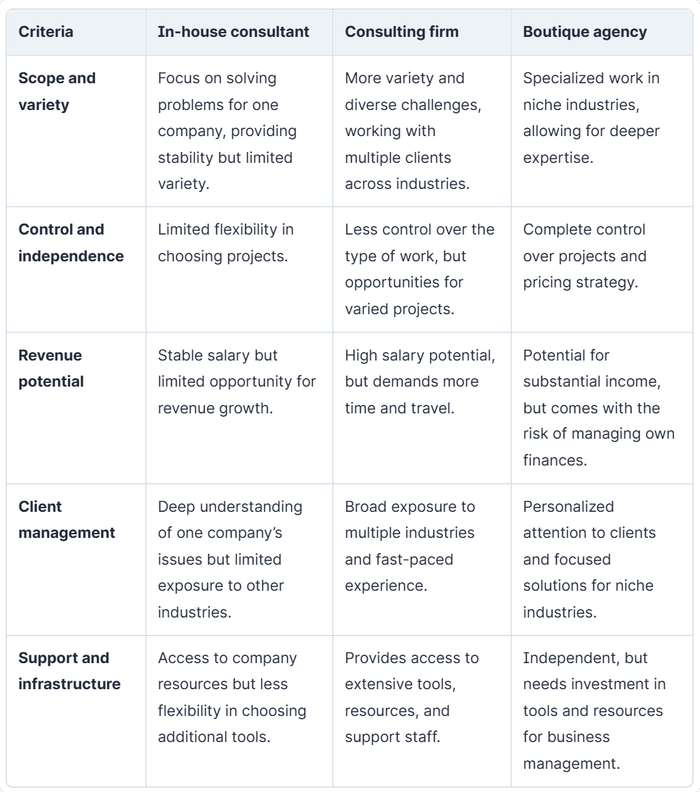
Combining various consulting business types
Here are some setups for combining various consultancy roles – independent consulting, agency work, and in-house consulting setups.

Each setup maximizes flexibility and income potential, making it easier for consultants to take advantage of different opportunities within the industry.
Setup 1: Independent consultant + freelance for a boutique agency
This setup combines self-employed consulting with contract work at a boutique agency.
- You act as an independent consultant for direct clients with full control over project rate and client selection.
- In addition, you freelance at a boutique agency to fill gaps in client work or for additional income.
- You can leverage the agency’s marketing and client acquisition to attract potential clients you might not reach independently.
- This setup is ideal for consultants seeking independence with the stability of agency projects.
Setup 2: Full-time in-house consultant + side consulting practice
A nice set-up for consultants with a full-time in-house role who want extra projects.
- You work as an in-house consultant to build expertise in one company’s processes, benefiting from steady income.
- Then, you take on select independent consulting projects in your spare time and focus on areas that complement your in-house role.
- You can set higher hourly rates for side projects – creating a premium consulting service without disrupting full-time work.
- Great for consultants wanting income diversification without leaving their main position.
Setup 3: Consulting firm + independent consulting on niche projects
A blend for consultants working at a larger consulting firm who want to build a personal brand in a niche.
- You work at a consulting firm to gain experience across various industries, establish broad consulting skills, and gain exposure to different business pain points.
- On top of that, you can develop a side consulting practice in a niche area, such as IT consulting or digital marketing, positioning yourself as a specialist for specific industries.
- Use firm projects to showcase credentials when marketing your niche consulting service to enhance your brand consultant profile.
- This setup builds industry credibility while allowing for personal consulting growth.
Setup 4: Part-time in-house consultant + independent consultant in the same industry
This setup is suited for in-house consultants who want to start consulting independently within the same field.
- You work as a part-time in-house consultant to build solid industry expertise, especially useful in fields like human resources or financial consulting.
- Use independent consulting to offer complementary services to non-competing clients in the same field, such as advising businesses on related HR processes or brand management.
- This allows you to manage financial needs with a stable in-house role while gradually expanding your client base.
- This setup comes with a stable income while easing the transition to fully independent consulting.
Setup 5: Consulting firm contractor + brand consultant for personal clients
This model is for consultants wanting structured work and personal flexibility.
- Get contracted by a consulting firm to access resources and high-profile projects, benefiting from the firm’s infrastructure and industry connections.
- Then, you offer brand consulting to small businesses or startups on the side to build client relationships and a personal name as a brand consultant.
- Use company experience to inform independent work, attracting new clients through word-of-mouth and online advertising.
- Good for those who want to work with diverse clients but keep a foot in structured consulting.
How to run a consulting business: step-by-step

Breaking into the consulting field
Sometimes, the first step is the hardest, but knowing where to begin makes all the difference. Below, you'll find practical strategies alongside expert insights to help you navigate the early stages of starting a consulting business effectively and confidently.
#1 - Managing finances and setting up legally
Starting a consulting business involves more than just expertise – you have to ensure your finances and legal structure support long-term success. Taking care of your legal setup from the beginning can save you time, money, and stress.
Choosing the right payment methods
Determining how you’ll get paid is critical to maintaining a healthy cash flow. Here are some common payment structures:
- Retainers: Clients pay a set fee upfront for ongoing access to your services. Ideal for predictable, recurring work.
- Hourly rates: You charge based on the hours worked. Best for short-term projects or tasks with unclear scope.
- Project-based fees: A fixed price for a defined deliverable. It works well when you can estimate the time and resources needed.
For flexibility, consider a hybrid model. For example, use a retainer for routine services but switch to project-based fees for high-impact deliverables. This approach accommodates varying client needs while stabilizing your income.
Setting up your company
Consider forming an LLC to protect your assets, and consult a tax advisor to understand your obligations. Insurance, such as professional liability, offers additional security and protects against unforeseen risks.
Many entrepreneurs overlook the importance of separating personal and business finances, leading to complications in tax filing and liability disputes. Another common trap is underestimating the need for adequate insurance coverage – leaving the company vulnerable to unexpected claims or losses.
Simplifying financial management
Financial tools streamline operations and ensure compliance. Options like Freshbooks and Xero make invoicing and accounting more efficient. For templates to track finances effectively, check out these balance sheet templates.
While certifications aren't strictly mandatory for a successful consulting career, they significantly enhance your professional image. In competitive fields, possessing relevant credentials demonstrates expertise.
#2 - Securing certifications or credentials
While certifications aren’t always mandatory to succeed in consulting, they are crucial in enhancing your professional image. In competitive industries, even a single credential signals expertise and helps you stand out to potential clients.
Certifications worth pursuing for consultants
Here are some certifications tailored to different consulting niches that can elevate your credibility:
- Project Management Professional (PMP): Ideal for consultants specializing in project management and overseeing complex initiatives.
- Lean Six Sigma Green Belt: Valuable for consultants focused on operational efficiency and quality control.
- Certified Management Consultant (CMC): A globally recognized certification for management consultants to showcase strategic advisory skills.
- Chartered Financial Analyst (CFA): Essential for finance consultants involved in investment management and financial analysis.
- Certified Information Systems Auditor (CISA): Suited for consultants in IT audit, control, and security.
- Certified Human Resources Professional (CHRP): Beneficial for consultants specializing in human resources and organizational development.
- Google Analytics Individual Qualification (GAIQ): Ideal for consultants focusing on digital marketing and data analysis.
# 3 - Building a personal brand from scratch
What if you could establish a strong personal brand that opens doors without a huge investment? You can create a professional presence that resonates with your audience in just a few actionable steps.
Below is an expanded checklist divided into must-do essentials and nice-to-do actions, giving you the flexibility to prioritize based on your resources.
Must-do: the essentials
- Create a professional website: Use platforms like WordPress or Wix to design a site with a concise bio, services offered, and a contact form. Include a blog section for sharing insights, using simple layouts that emphasize readability
- Craft a professional email signature: Add your name, title, website link, and a short tagline. Consider including a subtle call-to-action like “Read my latest article.” or a link to your services
- Publish helpful content: Create a FAQ or downloadable guide addressing key pain points in your niche. Use real examples or case studies to make your content actionable and relatable.
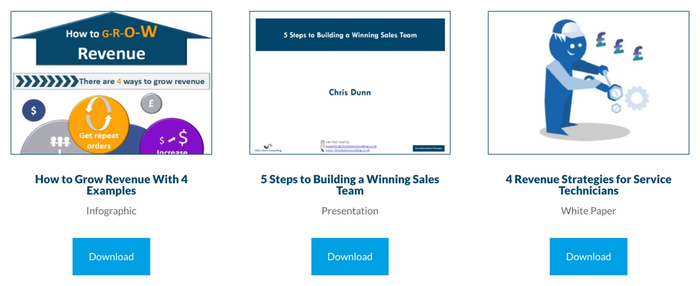
- Register for directories: List yourself on platforms like Google Business Profile or industry-specific directories. Ensure your profile includes professional photos, reviews, and accurate contact information.
- Leverage client testimonials: Collect short, impactful quotes from past or initial clients. Use these on your website or email signature to establish credibility.

Nice-to-do: adding more impact
This expanded checklist provides many low-budget yet impactful strategies to build your personal brand.
- Guest blogging: Submit well-crafted articles to niche blogs or industry sites. Tailor content to address the audience’s specific problems. You can start small – from niche sites – and then try to become a contributor at prominent media outlets.
- Create a lead magnet: Develop a free resource like a checklist, e-book, or template that is valuable to your audience. Offer it in exchange for email sign-ups to build your contact list.
- Host live sessions or Q&A videos: Use platforms like Zoom or YouTube to interact directly with your audience, answering questions and sharing tips. You can do that live, on-demand, or leveraging recordings.
- Start a video series: Create short, focused videos on common industry challenges. Publish them on YouTube or embed them in your blog.
- Develop a simple branding kit: Choose consistent colors, fonts, and a logo that reflect your niche and expertise. Use this branding across your website, content, and documents.
- Offer mini-consultations: Provide free 15-minute consultations to showcase your expertise and build rapport with potential clients.
#4 - Establishing credibility with existing contacts
For those with a background in consulting or related fields, your network may be your greatest asset when starting your own business. Reaching out to former colleagues, managers, or peers can quickly generate early opportunities.
With this approach, you provide a familiar starting point to leverage existing goodwill and professional relationships to generate revenue quickly.
Connor Gillivan, Entrepreneur and CMO of AccountsBalance emphasizes the value of referrals when starting out: "Having run multiple e-commerce businesses and scaled virtual teams globally, I began by offering tailored advice to peers and small business owners. I didn’t jump in cold—many of my first clients were referrals or individuals I’d already worked with in some capacity. Establishing credibility with existing contacts can be one of the most effective ways to get your foot in the door."
By reconnecting with past colleagues, you’re offering your expertise to those who already know your work ethic and skills. Start with personalized emails or messages, sharing how you can advise businesses within a certain industry.
For example, if you were an IT consultant in your previous career path, highlight how your experience can help companies manage technical challenges or improve processes.
When reaching out, tailor your approach in just three simple steps:
- Start with warm leads; Begin with individuals who are most familiar with your work.
- Highlight specific value; Determine your services and share how these can help their small business or team.
- Stay consistent; Follow up and maintain professional relationships over time to build trust.
Tapping into your existing network allows you to demonstrate value without extensive marketing efforts. This method helps attract clients early for future consulting work.
#5 - Leveraging networking for initial clients
If you’re starting with fewer connections or limited experience in consulting, networking is an invaluable tool to grow your new business and establish a successful consulting business. Unlike relying solely on existing relationships, networking introduces you to fresh opportunities and potential clients.
Josh Matthews, Director of LogicLeap, credits networking as a pivotal strategy for securing his first clients:"Networking played a crucial role; I leveraged connections made during my career to gain initial clients who trusted my expertise."
Research industry events and engage with professional communities. Whether it’s a local meetup for software development or an international conference, these gatherings help you meet potential new clients who may need your expertise.
For a sales consultant, this could mean networking at trade shows where businesses seek advice on increasing revenue.
To make the most of networking opportunities, prepare these essentials:
- Business cards: Keep them concise with your name, title, contact details, and a link to your website or LinkedIn profile
- Digital QR codes: Add a scannable code to your business card or have it ready on your phone to direct contacts to your portfolio or services page
- Elevator pitch: Practice a 30-second introduction about your expertise and how you help businesses improve or solve specific problems. You can also add it to your LinkedIn profile
- Portfolio or case studies: Bring printed or digital examples of your work to showcase your ability to advise businesses and deliver results
- Professional attire: Dress to reflect your expertise and align with your target industry for a polished first impression
- Notebook or notes app: Jot down key details about people you meet to help with personalized follow-ups and staying organized
#6 - Identifying a niche and building trust
Identifying a niche that aligns your expertise with market demand is crucial for building a successful consulting business. Focusing on a specific area allows you to tailor your services to meet the unique needs of a targeted audience, enhancing your value proposition.
Daniel Bunn, Managing Director at Innovate, emphasizes the importance of starting small and concentrating on a particular niche to leverage word-of-mouth referrals.
He shares: "I initially started by identifying a niche where my skills matched a demand – working with small businesses to enhance their digital presence.
My entry into consulting was somewhat organic; I began by offering freelance design and web services, which gradually transitioned into consulting as clients sought guidance on broader strategies, such as brand positioning and website effectiveness. Word of mouth played a huge role, as satisfied clients often referred me to other business owners in need."
To effectively choose your niche, assess your skills and experiences to determine areas where you can offer significant value. Conduct market research to identify sectors with unmet needs or growing demand. Yet, like any strategic decision, it brings both opportunities and potential limitations that are worth considering.
Pros of specializing in a specific niche:
- Enhanced expertise: Focusing on a particular area allows you to develop deep knowledge and skills so you can position yourself as an authority in that field.
- Targeted marketing: Specialization enables you to craft marketing messages that resonate with a specific audience, improving client attraction and engagement.
- Premium pricing: Clients often perceive specialized consultants as more valuable, allowing you to command higher service fees.
- Reduced competition: Operating in a narrow niche can mean fewer competitors, making it easier to stand out in the market.
Cons of specializing in a specific niche:
- Limited market size: A very specific niche may have a smaller client base, potentially restricting business growth opportunities.
- Market vulnerability: Economic downturns or industry changes can disproportionately impact a narrow niche, affecting your business stability.
- Skill obsolescence: Rapid advancements in a specialized field may require continuous learning to stay relevant, demanding significant time and resources.
- Perception of rigidity: Potential clients might view you as inflexible or less adaptable to broader challenges outside your niche.
Ultimately, the decision to specialize rests with you. However, clients increasingly seek consultants with specialized expertise – suggesting that focusing on a specific niche can lead to more sustainable success over time.
Strategies for growing your consulting business
Once you’ve established your consulting practice, the real challenge begins – running your business to make it profitable! Growth requires demand strategic thinking and a focus on delivering consistent value to your clients. We outline practical strategies to expand your consulting business, along with expert insights to help you leverage these approaches.
#1 - Focusing on long-term client relationships
Retaining a client is often easier and more cost-effective than acquiring new ones. Strengthening relationships with existing clients ensures steady revenue and can lead to referrals and additional projects.

Offering retainer agreements is one effective way to build loyalty and provide stability for both parties. Retainers allow clients ongoing access to your expertise while giving you predictable income.
For example, Connor Gillivan, Entrepreneur and CMO at AccountsBalance, emphasizes the importance of long-term engagements: "Rather than focusing on quick wins or one-off projects, I've prioritized creating ongoing value through retainer agreements or regular check-ins with clients. This ensures a steady revenue stream while deepening trust."
Other practices to strengthen relationships include:
- Providing consistent updates: Regular communication reassures clients that their investment is delivering results. For instance, a marketing consultant could schedule bi-weekly email reports highlighting key performance metrics like increased website traffic or social media engagement. Including a brief summary of upcoming tasks or goals further solidifies the value of the relationship.
- Tailoring your services: Adapting your solutions to meet changing client needs shows your commitment to their growth. For example, suppose you’re an IT consultant working with a small business. In that case, you might initially focus on cybersecurity but later expand your support to include cloud migration as their operations scale.
- Being proactive: Anticipating and addressing potential issues early demonstrates your foresight and expertise. For example, a financial consultant might alert clients to upcoming tax regulation changes that could impact their business and propose actionable strategies to stay compliant.
Strong client relationships create a foundation for growth – turning satisfied clients into advocates who can refer you to new opportunities.
#2 - Maintaining a high-touch approach
Would you rather feel like one of many or like the only one? This is the question your clients silently ask every time they engage with you. Personalization is what sets exceptional consultants apart, creating an experience that feels tailor-made for each client.

In a field as nuanced as consulting, cookie-cutter solutions don’t cut it—clients want strategies and insights that reflect their unique challenges and goals.
Jon Morgan, CEO of Venture Smarter, underscores the importance of this high-touch approach:"Working closely with clients and understanding their pain points lets us tailor our recommendations and establish long-term partnerships. This focus on personalized service has been a game-changer, allowing us to dedicate time and resources to clients who benefit most."
Personalizing services starts with listening. During initial meetings, ask detailed questions about their pain points, goals, and vision. Use this information to craft solutions that directly address their needs.
For example, if a retail client struggles with inventory management, a consultant could propose a step-by-step plan to integrate data-driven stock control systems rather than offering a general business audit.
This high-touch approach shows clients you are invested in their success. Tailored services make clients feel valued and understood, paving the way for lasting partnerships and stronger referrals.
#3 - Building partnerships with complementary businesses
Consulting doesn’t have to be a solo journey – partnering with aligned, non-competitive businesses can open doors to new opportunities and audiences. Imagine working with companies that complement your services, allowing both sides to grow together while offering greater value to shared clients.
These partnerships could include:
- Marketing agencies – A business consultant can team up with marketing agencies to offer clients a full-service experience, blending business strategy with targeted marketing solutions.
- Tech providers – Collaborating with CRM software companies or productivity tool providers allows consultants to recommend tools that facilitate client operations while offering implementation guidance.
- HR firms – Partnering with HR services can help consultants provide clients with workforce solutions, such as team restructuring or leadership training, to complement their strategic business advice.
Collaborations like these can help you extend your reach without building a network from scratch.
Jorge Argota, a digital marketing expert, explains:"I partnered with complementary businesses, which expanded my reach to new client bases. Focusing on client needs and continuously innovating my services based on feedback was key. These partnerships not only increased visibility but also strengthened my reputation in the industry."
What you can offer in a partnership:
- Joint service: Bundle your expertise with your partner’s offerings to create comprehensive client solutions.
- Referrals: Establish a referral system where you direct clients to each other for services outside your scope.
- Co-marketing opportunities: Partner on webinars, whitepapers, or industry events to share audiences and increase visibility.
- Commissions: Offer a percentage-based incentive for successful referrals, motivating partners to bring you qualified leads.
With strong partnerships, you can tap into new audiences, create a network of verified collaborators, and provide additional value to clients.
#4 - Optimizing for SEO
To attract clients, they first need to know you exist, and SEO is how to make that happen. However, the approach to SEO differs when targeting local businesses versus a global audience. Below, we’ll explore how to tailor your strategy to effectively reach your desired clients – whether they’re around the corner or across the globe.
Local SEO for consultants
Creating a Google Business Profile is a must-have for consultants serving specific regions. This free tool allows you to appear in local searches and Google Maps, increasing visibility.
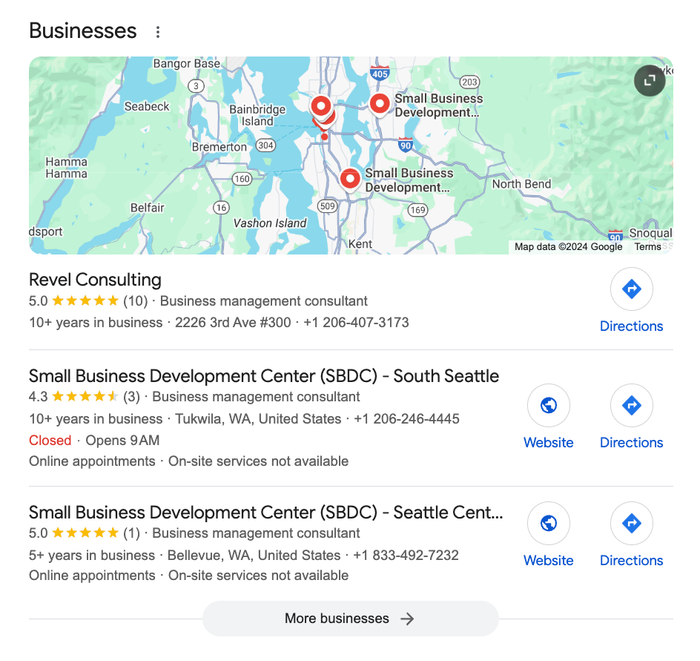
To enhance your profile:
- Use local keywords like “[niche] consultant [city name]” in your description (for example: small business consultant Seattle, ecommerce consultant London, business consultant Toronto)
- Encourage clients to leave positive reviews – they improve your rankings, and high rankings make your business trustworthy.
- Add accurate contact information and photos to complete your profile and make it look more professional.
Expand your reach by listing your business on platforms like Yelp or Thumbtack, which cater to users looking for services in their area.
Global SEO for consultants
If your consulting practice isn’t tied to a specific location, focus on a broader SEO strategy to attract clients worldwide. Here are three key elements to prioritize:
Keyword research
Identify terms potential clients use when searching for services like yours, such as "small business consultant" or "scaling strategies for startups." Tools like AlsoAsked.com can help uncover related keywords and questions your target audience is asking, which you can address directly on your website.
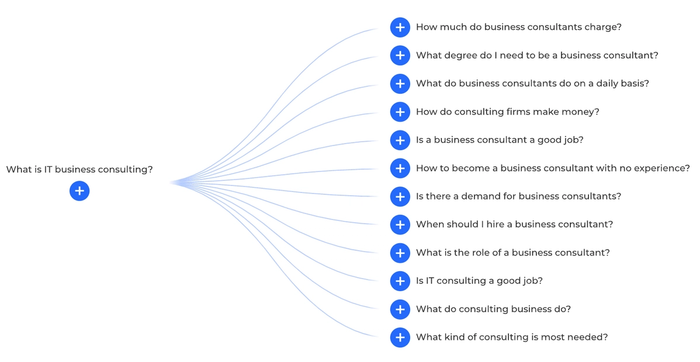
Content creation
Publishing targeted high-value content builds your credibility and attracts potential clients. Optimize it with relevant keywords from your research. Examples of content marketing formats for a small business consulting blog include:
- Blog posts like "10 Common Challenges for Small Businesses and How to Overcome Them" or "The Small Business Owner’s Guide to Effective Time Management."
- Case studies such as "How I Helped a Local Coffee Shop Increase Profits by 30%" or "Scaling a Boutique Retail Business: A Success Story."
- Whitepapers offering actionable insights, like "The Ultimate Guide to Financial Planning for Small Businesses" or "Key Strategies for Sustainable Small Business Growth."
Technical SEO
Ensure your website loads quickly, is mobile-friendly, and uses structured data to make your content more accessible to search engines. While other technical factors can further improve your SEO, focusing on these essentials gives you a solid starting point for optimization.
#5 - Leveraging social media for growth
Social media gives consultants a lot of free opportunities to post, is packed with niche communities, and allows businesses to run budget-friendly paid ads. It’s where connections happen, so as a consultant, you shouldn't miss this one out.
Choosing platforms based on your niche
Below is a comparison of platforms and how consultants can use them:
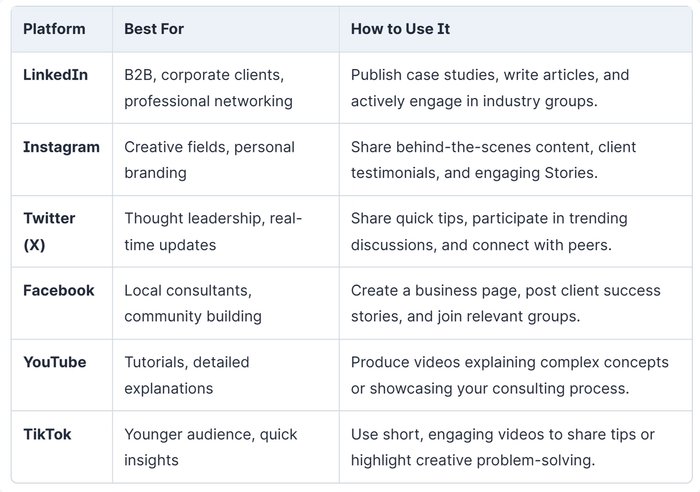
While certain platforms lend themselves better to specific niches – like LinkedIn for B2B and Instagram for visual storytelling – it’s important not to 'box yourself in.' With the right strategy, any platform can work for any niche. Experimenting across multiple platforms helps you discover what works best for your audience.
Sharing case studies, tips, and testimonials
Posting client success stories builds credibility. For example, a short LinkedIn post could summarize a challenge you solved, accompanied by a client testimonial. Similarly, creating a carousel on Instagram that walks through “before-and-after” results can make your impact tangible.
Sharing tips is another exciting way to showcase expertise. Break down complex ideas into actionable advice that resonates with your audience. Use captions, infographics, or short videos to make the content accessible and engaging.

Engaging with followers
To build relationships, interact directly with your audience:
- Polls: Ask questions to understand their pain points or preferences. For instance, a poll on Instagram Stories could explore the challenges small businesses face with time management.
- Q&A sessions: Host live sessions on platforms like LinkedIn or Instagram to answer audience questions and offer real-time advice.
- Behind-the-scenes content: Share glimpses of your consulting process – no matter if you’re preparing for a client meeting or brainstorming solutions – to humanize your brand.
Social media thrives on authenticity. Mixing expertise and interacting with people can help you grow your consulting business.
Innovative approaches to scale
As your consulting business grows, you’ll eventually face a pivotal decision: stay small and focused, or take steps to scale. Scaling means expanding your reach, increasing revenue, and often delegating work – but it requires a clear strategy.

If you’re ready to take your consulting business to the next level, here are a few effective ways.
#1 - Turning services into scalable products
Only some people think about it, but turning your custom services into scalable products can transform your business. Creating DIY templates, guides, or e-courses allows you to serve more clients without increasing your workload. For example, if you specialize in project management, a downloadable guide on "How to Streamline Operations in 30 Days" could be a valuable product.
Jay Melone, founder of Profit Ladder, highlights the impact of productizing services:
"The biggest growth system I built for my consulting company came by turning my premium, done-for-you services into affordable, do-it-yourself products. These free and low-ticket products attracted ideal clients, shortened sales cycles, and generated predictable (passive) revenue."
Packaging your expertise into products creates a revenue stream that runs parallel to your direct consulting work – freeing up time while still delivering value.
#2 - Building a small team to scale operations
A well-organized team allows you to focus on strategy while others handle execution.
Start by hiring a virtual assistant for administrative tasks like scheduling or invoicing. Bring on subcontractors or junior consultants to manage client deliverables as you grow.
For example, a financial consultant might delegate data analysis to a junior team member while focusing on high-level strategy for clients.
To ensure quality, develop clear workflows and provide training. Regular check-ins and feedback loops help maintain standards while empowering your team to take ownership of their tasks. Delegating can let you scale operations without compromising the quality clients expect.
#3 - Providing consistency
Delivering outstanding results consistently is the backbone of a thriving consulting business. When clients see their expectations exceeded time and again, loyalty grows, and so does the likelihood of referrals and repeat business. Quality becomes your signature, setting you apart in a competitive market.
Mohit Gogna, Principal Consultant at Platino Consulting, shares his experience:"What’s worked best for growing my business has been delivering consistent, high-quality results, which has naturally led to client referrals and long-term partnerships, including working with a lot of the same individuals at different companies."
#4 - Automating processes and creating passive income
Growing a consulting business can feel like a constant juggling act. Automation helps you regain control and creates opportunities to scale your efforts sustainably.
You should use:
- CRM systems: Tools like Capsule CRM help you with overall client management
- Financial management: QuickBooks and Xero simplify invoicing and cash flow monitoring
- Proposal software: Proposify and PandaDoc allow you to create and track client proposals
- Email marketing: Platforms like Transpond or ActiveCampaign automate email nurturing
- Project management: Asana and Trello help you organize tasks and track deadlines
- Scheduling tools: Calendly or Acuity simplify scheduling, eliminating back-and-forth emails
- Document storage and sharing: Google Drive or Dropbox provide secure, centralized file management.
Using these tools reduces manual workload and creates time for strategic growth or developing passive income streams like e-books or online courses. We'll talk about them in detail below.
#5 - Diversifying consulting income
Who said consultants can’t have a little fun while making money? Diversify your revenue streams with these cheeky but practical ideas that add depth to your business model:
1. Sell online courses
Turn your expertise into a binge-worthy series. A financial consultant could offer a “Budget Hacks for Entrepreneurs” course through platforms like Teachable or Udemy. You only record it once, and it keeps selling!
2. Create and sell templates
Save your clients time by selling pre-designed solutions. A business consultant could offer pitch deck templates, or business plan guides on Etsy or Gumroad. Easy to produce, easy to sell.
3. Write an e-book
Share your insights in an affordable, downloadable format. A marketing consultant could write “10 Social Media Tricks for Instant Engagement” and sell it on Amazon or their website. Minimal cost, maximum reach.
Here's an example of an e-book:
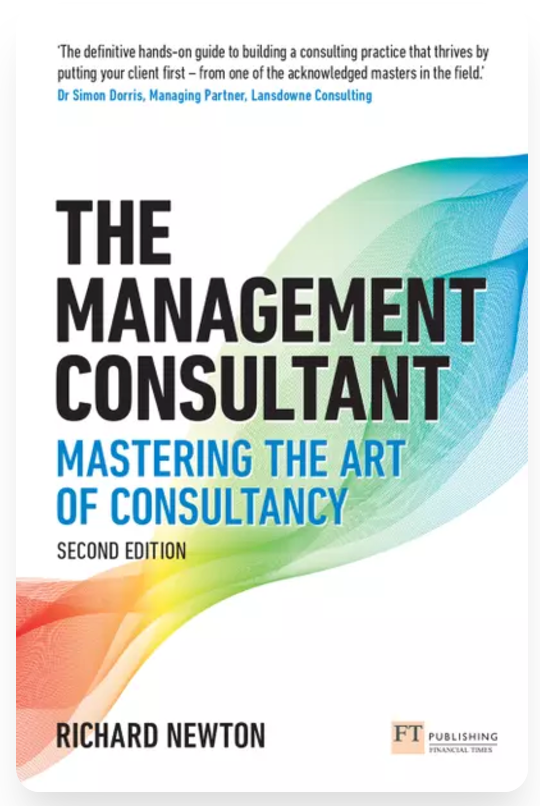
4. Host workshops or webinars
Teach live sessions packed with actionable advice. A leadership consultant might run a “How to Lead Remote Teams” workshop over Zoom. Charge per seat and add a Q&A for extra interaction.
5. Offer subscription-based services
Package ongoing advice or exclusive resources into a membership. A productivity consultant might provide monthly time management tips and group coaching for a flat fee – steady cash flow.
Diversifying doesn’t just cushion your income – it makes you more valuable. Plus, who doesn’t want their business to earn while they sleep?
#6 - Expanding service offerings
Growing your consulting business doesn’t always mean doing more; it means doing more of what your clients need. Adding complementary services tailored to client demand increases the value you deliver while boosting your revenue. But the trick is to expand strategically, not haphazardly.
Adding complementary services
Start by identifying gaps in your current offerings. For example:
- if you’re a digital marketing consultant, clients might benefit from SEO audits or content creation packages.
- or, if you’re a financial consultant, adding retirement planning workshops or tax strategy sessions could be a logical next step.
Focus on services that naturally align with your expertise and fit your client base’s needs.
Piloting new services
Before a full rollout, test the waters. Offer your new service to a small group of existing clients at a discounted rate or even for free. For instance, a sales productivity consultant could pilot a workflow training session with one client and gather feedback. Use this phase to refine your approach, identify potential pitfalls, and ensure your new service meets expectations.
Exploring bundled packages
Consider creating bundled service packages that offer multiple solutions at a slightly reduced rate.
For example, a consultant specializing in small business growth might combine business planning, financial forecasting, and branding strategy into one package. Bundles appeal to clients seeking comprehensive support while increasing your revenue per project.
Launching too broadly without testing can backfire, but a thoughtful pilot or bundling strategy ensures you bring polished, valuable services to the market. Strategic expansion satisfies existing clients and attracts new ones, helping your business grow sustainably.
Mistakes and lessons learned
Every consulting journey has its hiccups. Mistakes often become the best teachers, shaping how you refine your approach and build a more resilient business.
Here are common challenges consultants face, with lessons learned from seasoned professionals.
Time management challenges
Balancing client work with strategy and operational tasks can feel overwhelming. Spending too much time on client calls or administrative duties leaves little room for strategic growth. Connor Gillivan, Entrepreneur and CMO of AccountsBalance, learned this the hard way:
"I’d fill up my calendar with client calls, leaving little time for deep strategy sessions or refining my service offerings. To fix this, I restructured my schedule and started setting clearer expectations with clients about availability and deliverables."
Taking control of your time starts with clear boundaries. Block time for focused work, automate administrative tasks and communicate availability to avoid burnout.
Focusing on your core strengths
Taking on projects outside your expertise can dilute your brand and stretch your resources thin. Daniel Bunn, Managing Director at Innovate, emphasizes the value of narrowing focus:
"One of my early mistakes was taking on every project that came my way. This led to burnout and less-than-optimal outcomes. Now, I focus on projects where I can deliver the most impact, which has helped me maintain higher quality and a healthier work-life balance."
Prioritize projects that align with your skills and values. Decline work that doesn’t fit your niche to preserve energy and reinforce your brand’s reputation.
Valuing your work appropriately
Underpricing services to win clients can hurt your business in the long run. Josh Matthews, Director of LogicLeap, shares his experience:
"One mistake I made early on was undervaluing my services. In an attempt to attract more clients, I set lower rates, which didn’t reflect the true value of my work. Learning to price appropriately and confidently communicate the value of our offerings was a critical turning point."
Ensure your pricing reflects your expertise and includes time for preparation, execution, and revisions. Protect your time and prevent scope creep with detailed contracts outlining deliverables and payment terms.
Extra resources for consultants
Expanding your consulting expertise is essential for staying competitive and delivering value to clients. Here are some valuable resources to consider:
Books:
- The McKinsey Way by Ethan M. Rasiel
Offers insights into the problem-solving techniques and management strategies used by McKinsey consultants. - Flawless Consulting: A Guide to Getting Your Expertise Used by Peter Block
Provides practical advice on building trust and effectively engaging with clients. - The Trusted Advisor by David H. Maister, Charles H. Green, and Robert M. Galford
Explores the dynamics of client relationships and how to become a trusted consultant. - The Secrets of Consulting: A Guide to Giving and Getting Advice Successfully by Gerald M. Weinberg
Shares wisdom on the art of consulting, including practical techniques and humorous anecdotes. - Million Dollar Consulting: The Professional's Guide to Growing a Practice by Alan Weiss
Offers strategies for building a successful consulting business and attracting high-value clients.
Podcasts:
- The McKinsey Podcast
Features discussions on current business trends and insights from McKinsey experts. - Consulting Success Podcast
Hosted by Michael Zipursky, this podcast delves into strategies for building a successful consulting business. - The Strategy Skills Podcast
Focuses on developing strategic thinking and problem-solving skills relevant to consulting. - Unleashed - How to Thrive as an Independent Professional
Offers insights and interviews with successful independent consultants. - The Craft of Consulting Podcast
Provides practical advice on starting and running a consulting business.
Webinars and Online Courses:
- Coursera's Management Consulting Specialization
Offers courses on essential consulting skills, including problem-solving and client communication. - Harvard Business Review Webinars
Provides webinars on various business topics, including leadership and strategy, beneficial for consultants. - LinkedIn Learning's Consulting Courses
Features a range of courses covering consulting fundamentals, client management, and business development. - Udemy's Consulting Courses
Offers a variety of courses on different aspects of consulting, from starting a business to advanced strategies. - Strategyzer's Business Model Generation Course
Teaches innovative approaches to business modeling and value proposition design.
Engaging with these resources can contribute to your growth and success as a consultant.
Why CRM is a way to go for consultants
Juggling multiple clients, endless follow-ups, and a growing to-do list... all while trying to stay organized and deliver exceptional value. It’s no easy feat, but what if you had a tool to simplify everything?
Capsule CRM offers practical tools that help consultants stay on top of everything, at all times.
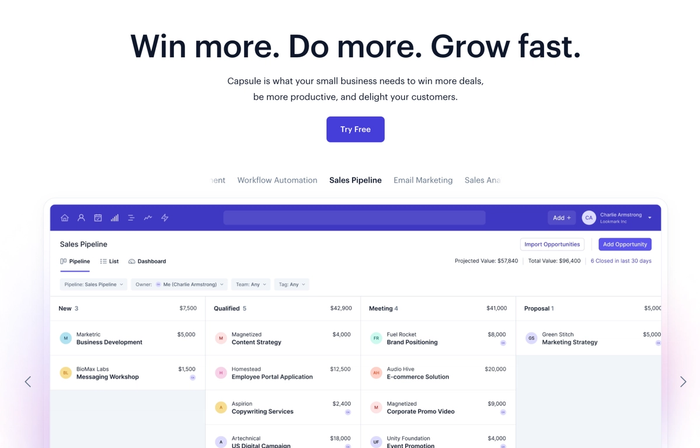
Here’s how Capsule's features translate into practical use for consultants:
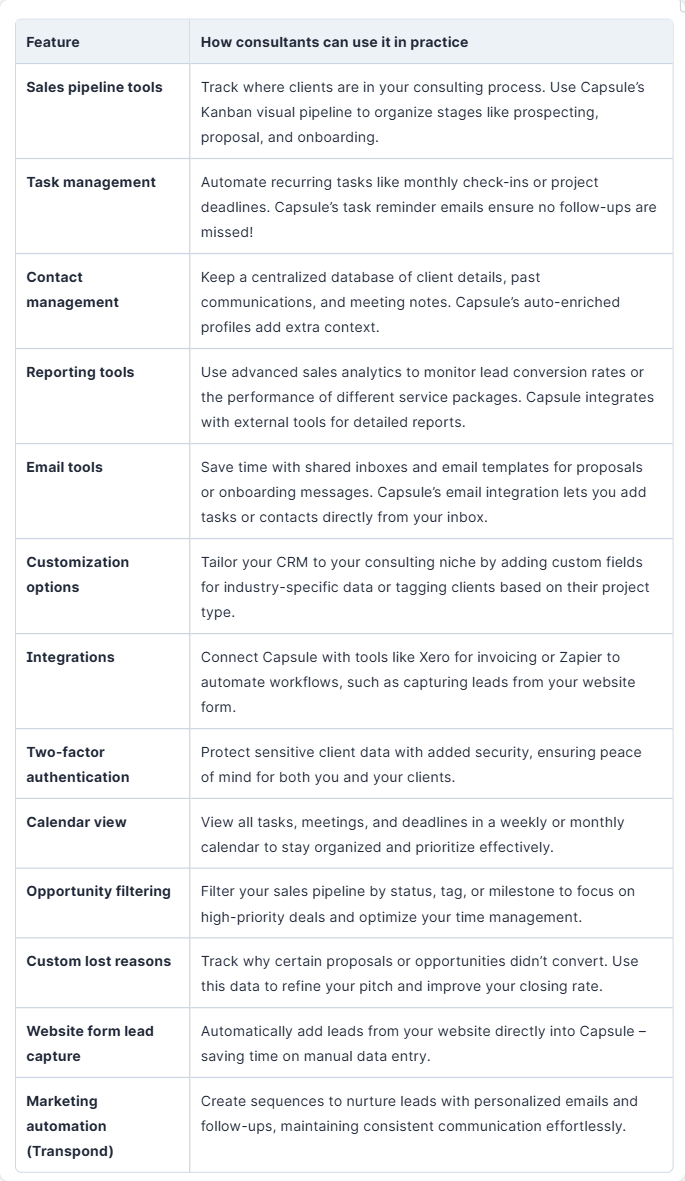
Here's why Capsule stands out for consultants:
- Ease of use: Its intuitive interface ensures time is spent consulting, not learning software.
- Scalability: Capsule adapts to your business as it grows to support consulting solopreneurs and larger teams.
- Customization: Pipelines, tags, and reports can align with your specific consulting needs – making them versatile for various niches.
- Affordability: Capsule provides excellent value with a free trial and flexible pricing for small and mid-sized consulting firms.
With Capsule, consultants can simplify workflows, enhance client engagement, and focus on strategic growth. Try it for 14 days for free and see how CRM can help you grow your business.
Conclusion
Growing a consulting business takes a mix of expertise, focus, and the ability to adapt. The tips in this guide are practical steps you can use immediately – whether you’re refining your niche, exploring new revenue streams, or improving your workflows.
Consulting is constantly changing, and staying successful means staying curious and open to learning. Every challenge is a chance to improve what you offer and strengthen the value you bring to clients. Take these ideas, make them your own, and keep moving your business forward.



![Business statistics every business owner should know [2026]](https://cdn.sanity.io/images/poftgen7/production/5619faf6a65f53406d3e554c11c9e894402d4397-5760x3240.jpg?rect=5,0,5751,3240&w=300&h=169&q=75&fit=max&auto=format)
